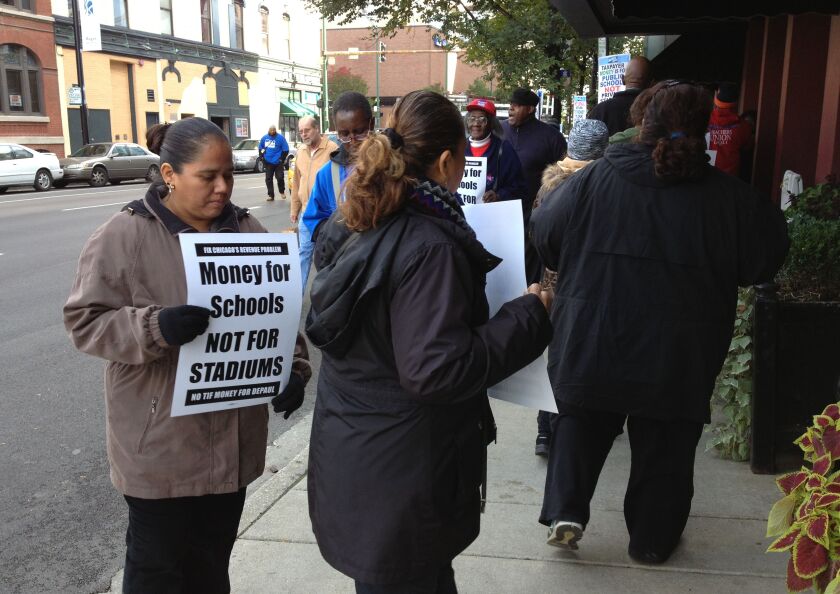Ever since Mayor Rahm Emanuel first proposed using $55 million in tax-increment-financing funds to help finance a 10,000-seat basketball arena for DePaul University that would double as an “event center” for McCormick Place, the project has been a symbol of what critics call the mayor’s misplaced priorities.
The drumbeat got so loud, Emanuel rearranged the financing so the TIF subsidy would be used to acquire land for the project and surrounding hotels, instead of to build the stadium.
On Monday, the controversy that reached a crescendo during the mayoral campaign was temporarily forgotten in the glow of a groundbreaking ceremony.
Emanuel joined officials from DePaul and McCormick Place to turn a symbolic first shovel on a massive project expected to generate 7,400 construction jobs, 2,500 permanent jobs and jump-start Motor Row. The mayor called it “breaking ground on the future” of Chicago’s, now-thriving convention business.
“This event center, plus the new Marquis Hotel — 7,500 people in the area are going to work building that future. . . . Because of these investments, because of the investment in the new transportation facility, there are new residential units going up, new restaurants, new entertainment. Exactly the vision we had,” Emanuel said.
The mayor added: “L.A. had started with the Staples Center. Come to McCormick Place and you’ll see this event center, the new hotel. . . . We have exactly what we need in Chicago to continue to, not only have the No. 1 place in the hospitality industry and convention business, but maintain that leadership because you cannot rest on your laurels. You have to always invest in that future.”
Rev. Dennis Holtschneider, DePaul’s President, noted that DePaul has a history of growing the nation’s largest Catholic university “in ways that serve the city’s needs.”
In 1998, DePaul helped the city redevelop the abandoned and shuttered Goldblatt’s department store at State and Jackson. Six years later, DePaul partnered with Columbia College and Roosevelt University on a super-dormitory that jump-started development further south on State Street.
“We’re particularly proud again to build in a way that might assist with the renaissance of the famed Motor Row and its South Loop neighborhoods. We’re also happy that we can help the city with a new facility for conventions, for concerts and many other events,” Holtschneider said.
“We’re happiest of all that Blue Demon basketball is coming home to Chicago. This brings a whole new meaning to home-court advantage. Our Blue Demons and our fans will have state-of-the-art facilities — facilities which members of our community can take advantage of and enjoy.”
Jack Greenberg, the retired McDonald’s chairman now chairing the McPier Authority board, said he “can’t wait to cheer the Blue Demons” in the fall of 2017.
“This groundbreaking would not be possible today without DePaul’s support and investment. And it serves as a model of collaboration for the future. Creating a shared space for all of us to use and enjoy. MPEA could not afford to build this without DePaul’s investment,” Greenberg said.
Two years ago, Emanuel argued that he wasn’t using public money to build a basketball arena for DePaul as much as DePaul was “subsidizing” an “event center” that McCormick Place needs to compete, thus freeing millions to renovate Navy Pier.
“If DePaul was not investing $70 million as a major anchor tenant, we would have to come up with the resources [to build the arena and] I would not have the ability to transfer resources to Navy Pier and do the revitalization,” Emanuel said on that day.
At the time, McPier officials claimed to have commissioned a consulting study that concluded the arena would “break even” the year it opens and make $1 million by year five.
The agreement calls for DePaul to contribute $70 million toward $173 million in construction costs and pay an annual rent of $25,000 a game for men’s basketball and $15,000 a game for women’s. DePaul will also get first right of refusal on available dates, but only after McPier blocks off convention and assembly dates it needs and presents the schedule to the university on April 1 of each year.
McPier officials have pegged annual operating costs at $3.7 million and estimated that the rent and non-logo-related concessions from DePaul games – which go to McPier – would cover one-third of that.
As for the forgotten controversy over the TIF subsidy, local Ald. Pat Dowell (3rd) said Monday it’s turned into a “non-issue.”
“They switched it to the hotel and the purchase of the land. TIF money is being used the way tif money is supposed to be used. It’s supposed to support economic development, job creation and it’s doing just that with the creation of 7,500 construction jobs and over 2,500 permanent jobs,” she said.
Dowell said she has no doubt the event center will be busy enough to make money and justify the public investment.
“DePaul games, MPEA events. It could be a concert venue. Perhaps large church conventions could use them. The public schools for championship games, public league games. I’m sure there won’t be a problem filling the stadium,” she said.





